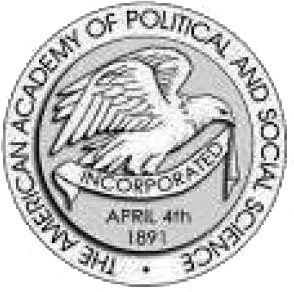| School | Troops | Resources |
American Academy of Political and Social Science

[Note: Part of the HET Website. This page is not related to or endorsed by the AAPSS or any other organization. See the official AAPSS website]
The American Academy of Social and Political Science (AAPSS) was founded in Philadelphia, Pennsylvania, on December 14, 1889, at a conference with 22 members. Most were teachers at local-area colleges (notably Pennsylavnia, Swarthmore, Bryn Mawr).
At this time, there were three societies already in existence whose researchers overlapped into the social sciences - the American Statistical Association (f.1839), the American Social Science Association (f.1865), the American Economic Association (f.1885). The AAPSS was designed as a successor to the second of these, the SSA.
The SSA had been originally founded in Boston in 1865 by a group of American social reformers, under the title "American Association for the Promotion of Social Science" (only later renamed "Social Science Association"). It was modeled on an equivalent British society, the National Association for the Promotion of Social Science (NAPSS) founded by Henry Brougham in 1857. Neither the NAPSS in Britain nor the SSA in the US were academic-oriented institutions. Rather, they were designed as networks of social reformers of various backgrounds (academics, activists, professionals, businessmen, government officials, etc.). The associations put them in touch with each other and in communication with politicians, in order to coordinate a variety of social reforms and bring them into legislation, e.g. on public health, sanitation, education, penal reform, trade unions, etc. They organized a large annual conference, where papers, studies and proposals were presented by the reformers. As social science became professionalized and legislatures started commissioning their own research, the need for these societies gradually fell away. The British NAPSS was defunct by 1886 and the American SSA was moribund, wounded by the creation of the AEA. Indeed, the SSA had never really been very vigorous. As most relevant legislation on social reforms tended to be conducted at the state level, rather than federal, the SSA had been little more than a national umbrella for various state-level associations, and the degree of activity of the state associations varied enormously. The Pennsylvania Social Science Association in Philadelphia was one of the most active, and grew impatient with the lethargic leadership of the distant SSA in Boston. Pennsylvania social reformers decided to break off and form the spearhead of their own national association.
The American Academy of Political and Social Science (AAPSS) was formed in 1889 on the initiative of Pennsylvania-area academics, notably Edmund J. James of the University of Pennsylvania and Franklin H. Giddings of Bryn Mawr, most of whom had been active participants in the Pennsylvania branch of the Social Science Association, and annexed the latter after its creation. They founded their own journal, the Annals of the AAPSS in 1890. It was dedicated to producing short articles summarizing the most recent scholarly research in the social sciences in an accessible manner for public consumption and politicians, with the goal of informing and affecting social policy. A substantial part of its early articles were dedicated to economics. For some time, the Annals competed with other economics journals, and was sometimes regarded as the "house journal" of Penn's economics department, comparable to Columbia's PSQ, Harvard's QJE and Chicago's JPE. However, the Annals of the AAPSS never morphed into purely academic economics journal. As professionalization deepened, the AAPSS maintained its wide embrace of the social sciences, and its mission of connecting scholarly research with social policy. The economists who dominated its early years have since given way to sociologists, political scientists, criminologists, and others.
|
Presidents of the American Academy of Political and Social Science
|
| HET
|
|
Resources on the American Academy for Political and Social Science |
All rights reserved, Gonšalo L. Fonseca
